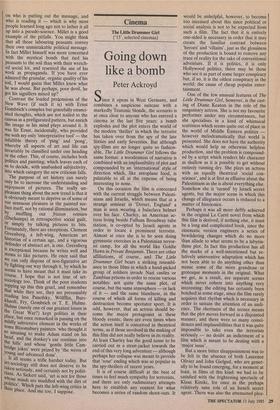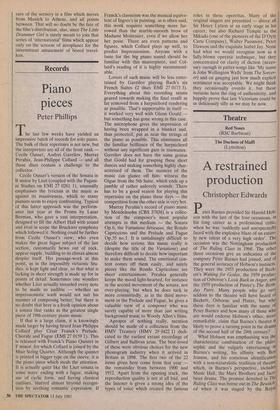Cinema
Going down like a bomb
Peter Ackroyd
Since it opens in West Germany, and combines a suspicious suitcase with a markedly Teutonic blonde, the scenario is at once clear to anyone who has entered a cinema in the last five years: a bomb explodes and the plot enters the world of the modern 'thriller' in which the terrorist has taken over from the spy of the late Sixties and early Seventies. But although spy-films are no longer quite so fashion- able, The Little Drummer Girl follows the same format: a woodenness of narrative is combined with an implausibility of plot and compounded by an 'international' style of direction which, like aeroplane food, is palatable to all at the expense of being interesting to none.
On this occasion the film is concerned with the current struggle between Palesti- nians and Israelis, which means that at a strange seminar in 'Dorset, England' a man is seen wearing a balaclava helmet over his face. Charley, an American ac- tress living beside Fulham Broadway tube station, is co-opted by Israeli agents in order to locate a prominent terrorist. Almost at once she is to be seen doing gymnastic exercises in a Palestinian terror- ist camp, for all the world like Goldie Hawn in Private Benjamin. There are other affiliations, of course, and The Little Drummer Girl bears a striking resembl- ance to those films in which a hand-picked group of soldiers invade Nazi castles or Zambian prisons in order to rescue various notables: not quite the same plot, of course, but the same atmosphere — or lack of it — and the same blandness, in the course of which all forms of killing and destruction become spectator sport. It is odd, however, that an actress should be- come the major protagonist in these bloody events; there are even times when the action itself is conceived in theatrical terms, as if those involved in the making of this film did not really believe in its reality. At least Charley has the good sense to be carried out in a strait-jacket towards the end of this very long adventure — although perhaps her collapse was meant to provide that 'sour' ending which was so popular in the spy-thrillers of recent years.
It is of course difficult at the best of times to feel much sympathy for terrorists, and there are only rudimentary attempts here to establish any context for what becomes a series of random shoot-outs. It would be unhelpful, however, to become too incensed about this since political or social analysis is not to be expected from such a film. The fact that it is entirely one-sided is necessary in order that it may create the familiar contrast between 'heroes' and 'villains', just as the glossiness of the production is bound to remove any trace of reality for the sake of conventional adventure. If it is politics, it is only Hollywood politics; there may be those who see it as part of some larger conspiracy but, if so, it is the oldest conspiracy in the world: the cause of cheap popular enter- tainment.
One of the few unusual features of The Little Drummer Girl, however, is the cast- ing of Diane Keaton in the role of the sanguinary actress. She is not my favourite performer under any circumstances, but she specialises in a kind of whimsical scattiness which seems quite out of place in the world of Middle Eastern politics — however melodramatically that world is presented. She does not have the authority which would help an otherwise helpless production, and the problem is compound- ed by a script which renders litr character as shallow as it is possible to get without entirely running dry. She plays an actress with an equally theatrical 'social con- science', and is at first as effusive about the Palestinians as she is about everything else. Somehow she is 'turned' by Israeli secret agents, but the major scene in which this change of allegiance occurs is reduced to a matter of histrionics.
Perhaps it was all more deftly achieved in the original Le Carr d novel from which this film is derived; if nothing else, it must be a long and complicated book, since the cinematic version engineers a series of bewildering changes which do no more than allude to what seems to be a labyrin- thine plot. In fact this production has all the marks of a well-intentioned but re- latively uninventive adaptation which has not been able to do anything other than mimic some of the more grandiose or grotesque moments in the original. What we get, as a result, are separate scenes which never cohere into anything very interesting: the editing has certainly been botched at some stage, since the film rarely acquires that rhythm which is necessary in order to sustain the attention of an audi- ence. The shortness of the scenes means that the plot moves forward in a disjointed manner, and there were so many coinci- dences and implausibilities that it was quite impossible to take even the terrorists seriously — no doubt an indictment of a film which is meant to be dealing with a 'major issue'.
But a more bitter disappointment was to be felt in the absence of both Laurence Olivier and John Gielgud, who are gener- ally to be found emerging, for a moment at least, in films of this kind: we had to be satisfied with the frightening spectacle of Klaus Kinski, for once in the perhaps relatively sane role of an Israeli secret agent. There was also the attenuated plea- sure of the scenery in a film which moves from Munich to Athens, and all points between. That will no doubt be the fate of the film's distribution, also, since The Little Drummer Girl is surely meant to join that series of 'international' films which appear only on the screens of aeroplanes for the intermittent amusement of bored travel- lers.











































 Previous page
Previous page